Is My Rose Bush Dead? (3 Critical Signs to Look For)
-
Pete Ortiz
- Last updated:
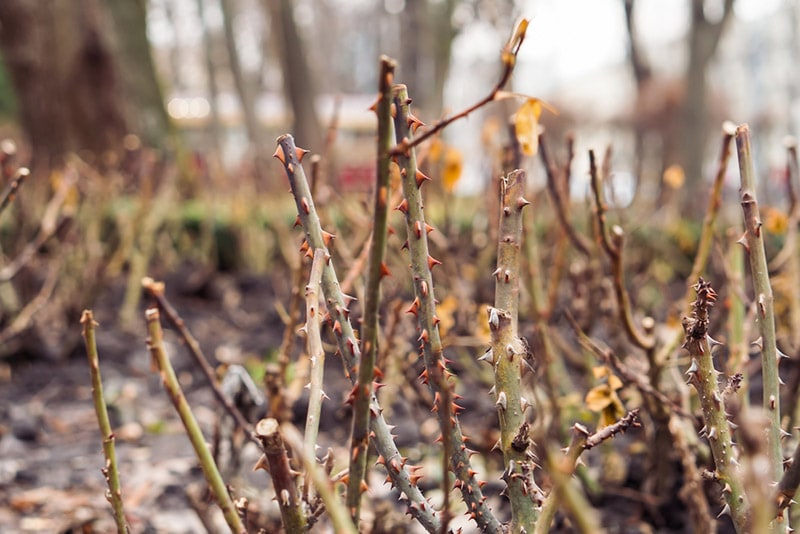
The last thing you want to see as a dedicated rose gardener is your beautiful rose bush wilting and flailing for life. But before you jump to conclusions, it’s a good idea to thoroughly examine it first.
Harsh weather, continued neglect, and disease could mean the end of your precious rose bush. But it’s not uncommon for it to appear dead when it really isn’t. Rose bushes become dormant during the winter to conserve energy for the coming season. It’s easy to mistake this dormancy for death when your rose bush is alive and thriving.
So, how do you tell whether your rose bush is dead or just resting? Keep reading to find out.
The 3 Signs Your Rose Bush is Dead or Dying
1. Wait for Leaves During the Springtime
One surefire way to tell that you’re dealing with a dead rose bush is when it doesn’t sprout during the spring. Like all other plants, rose bushes sprout during the springtime to take in all that lovely sunshine.
Wait till springtime and keep an eye out for any leaves. If the leaves sprout on the branches, then you can heave a sigh of relief. If it doesn’t show any sign of sprouting, your rose bush is dead and gone (sorry).
However, it’s worth noting that sometimes rose bushes delay sprouting. Observe your rose bush for any signs of sprouting, and clear any dead bark in case you see leaf buds. If you don’t see anything after three weeks, it’s safe to say that your rose bush is a goner.
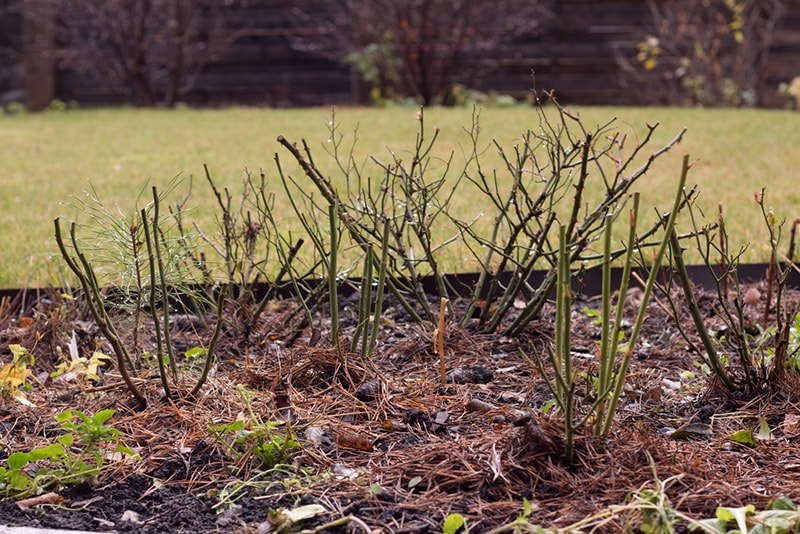
2. Try the Scrape Test
The scrape test is another excellent way to tell whether your rose bush is still going. This simple test only requires a small blade or anything with a sharp edge. Gently scrape the bark and see what lies beneath.
If you see a green, moist filament, then you have a thriving rosebush that’s just resting. If the filament is gray, brown, or black, then your rose bush is dead. Don’t bother scraping any deeper if the filament is brown and brittle. Doing so is a waste of time.
Always use clean equipment to conduct the scrape test. Make sure you sanitize the blade before scraping the bark, just in case your rose bush is still alive. If you don’t, you might infect an already weakened rose bush with a disease.
3. Check the Roots
It’s not uncommon for the upper part of the plant to be dead while the roots are still functioning. So maybe there’s still hope if your rose bush failed the scrape test.
If you have a potted rose plant, tip it upside-down and check the condition of the roots. If they look well spread out and strong, then your rose bush is still alive. If the roots appear brittle and shriveled, your rose bush has died. If the roots are still alive, you can revive the rose bush and bring it back to its former glory with a little water and manure.
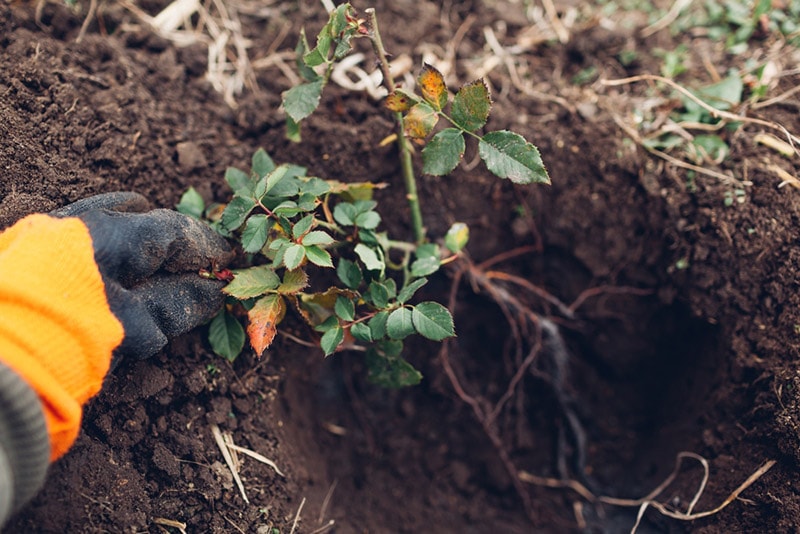
Ask an Expert
If the above methods turn out to be inconclusive, then you might want to consult a botanist. An expert can conclusively establish whether your rose bush is dead or whether it needs a bit of CPR. This is the only way to tell 100% whether your precious rose plant is dead or alive.
Consult a landscaping expert
Find a brick and stone specialist in your area, and get free, no-commitment estimates for your project.

What Could Potentially Kill My Rose Bush?
Assuming your rose bush isn’t dead, you have to protect it from things that could bring it harm. That said, here are a couple of things that could decimate your rose bush.
Dehydration
This is a no-brainer for most rose parents, but you’d be surprised how many people forget to water their rose bushes. In their first year of growth, rose bushes need 10 liters of water a week spaced out between two or three watering sessions. After the first year, hydrate your roses with about 2 to 3 inches of water every week.
It’s worth noting that your rose bush won’t die unless you completely dehydrate it for a week or so. If you’re going away for long, use a water wick to ensure your rose bush stays hydrated during your absence.
It’s worth noting that overwatering your rose bush could do just as much—or even more—damage than underwatering it. Overwatering, especially in poorly drained soils, can lead to wood rot. This is a type of disease that causes the roots to rot in damp conditions. Without the roots, the rose bush will be unable to absorb water from the ground and hence die off.
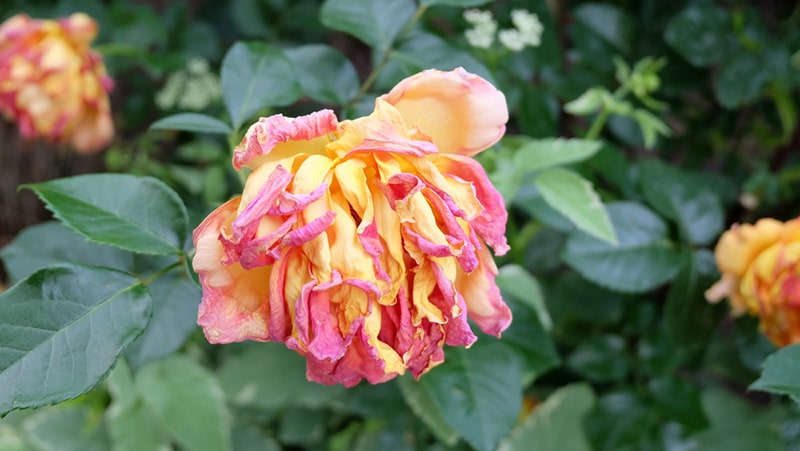
Disease
The rose plant is predisposed to many diseases, ranging from mild to severe. If these diseases go unchecked, you could easily lose your rose bush to them.
- Black Spot
- Powdery Mildew
- Crown Gall
- Rose Mosaic
- Rust
- Cankers
Thankfully, there are herbicides that can counter the effects of these diseases.
Pests
Pests can really do a number on your beautiful rose plants. Think along the lines of aphids, thrips, rose sawflies, slugs, and the like. One or two bugs won’t do much damage, but if you let them multiply and take over your rose bush, then you can kiss it goodbye.
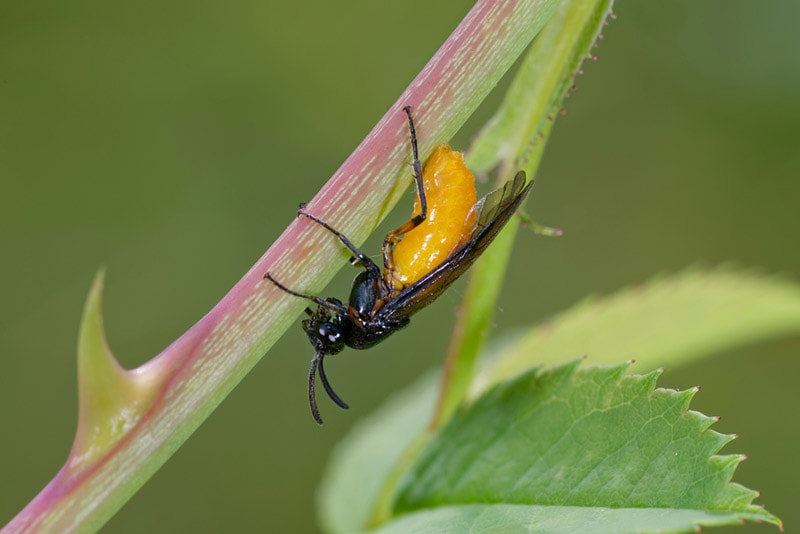
Overfertilization
Ever heard of the saying that too much of something is poisonous? Well, this certainly holds true for fertilizers on rose plants. While you want to nourish your rose bush with all kinds of nutrients, overdoing it is asking for trouble.
Too much fertilizer can stress your rose bush to the point of giving out. In some cases, the acid in the fertilizer may end up burning the roots and eventually dehydrating the plant.
Use only the required amount of fertilizer—no more, no less. Adding a lot of fertilizer won’t make your rose bush grow faster.
Conclusion
Your rose bush could easily be the highlight of your garden or lawn, but only if you take good care of it. With proper care, your rose bush could last you several years. Be on the lookout for the above signs, and if your rose bush is dead, don’t bother reviving it. You’ll have to get another one.
Featured Image Credit: Matushchak Anton, Shutterstock
Contents


